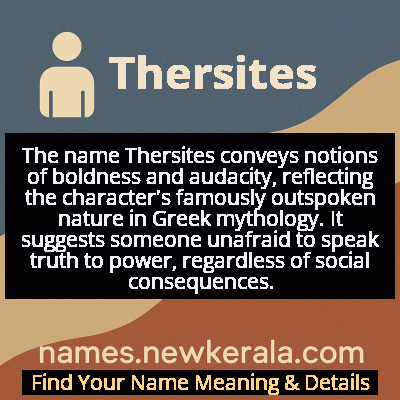Thersites Name Meaning & Details
Origin, Popularity, Numerology Analysis & Name Meaning of Thersites
Discover the origin, meaning, and cultural significance of the name THERSITES. Delve into its historical roots and explore the lasting impact it has had on communities and traditions.
Name
Thersites
Gender
Male
Origin
Greek
Lucky Number
6
Meaning of the Name - Thersites
The name Thersites conveys notions of boldness and audacity, reflecting the character's famously outspoken nature in Greek mythology. It suggests someone unafraid to speak truth to power, regardless of social consequences.
Thersites - Complete Numerology Analysis
Your Numerology Number
Based on Pythagorean Numerology System
Ruling Planet
Venus
Positive Nature
Harmonious, responsible, caring, and artistic.
Negative Traits
Overly idealistic, superficial, possessive, or jealous.
Lucky Colours
Pink, turquoise.
Lucky Days
Friday.
Lucky Stones
Diamond, turquoise.
Harmony Numbers
2, 3, 9.
Best Suited Professions
Artists, musicians, teachers, healthcare workers.
What People Like About You
Warmth, nurturing nature, artistic flair.
Famous People Named Thersites
Thersites of Homer
Mythological Soldier
Notorious common soldier in the Iliad who openly criticized Agamemnon and the Greek leaders during the Trojan War
Thersites (Historical Figure)
Athenian Citizen
Mentioned in historical records as participating in Athenian political life, though details are scarce
Thersites (Literary Character)
Satirical Figure
Appeared in various satirical works as a symbol of impudent criticism and social commentary
Name Variations & International Equivalents
Click on blue names to explore their detailed meanings. Gray names with will be available soon.
Cultural & Historical Significance
The name has evolved through Western literary tradition as a symbol of the impudent critic or malcontent. During the Renaissance and Enlightenment periods, Thersites was frequently referenced in political and social commentary as representing either the dangerous rabble-rouser or the courageous truth-teller, depending on the author's perspective. This dual interpretation reflects the ongoing cultural tension between respect for authority and the value of dissent in Western political thought. The character's legacy continues to influence discussions about class, speech, and power dynamics in both literary and political contexts.
Extended Personality Analysis
Individuals named Thersites are often characterized by strong critical faculties and a tendency toward outspokenness. They typically possess sharp observational skills and are not afraid to voice unpopular opinions, even when doing so might put them at social or professional risk. This combination of perceptiveness and boldness can make them both valuable truth-tellers and difficult colleagues, as they prioritize honesty over harmony in most situations.
Their personality often includes a streak of rebelliousness and skepticism toward authority figures, which can manifest as either constructive criticism or destructive contrarianism depending on their maturity and social intelligence. While they may struggle with traditional hierarchies and conventional thinking, they often excel in roles that require independent analysis and courageous speaking. The shadow side of these traits can include tendencies toward cynicism, argumentativeness, and social isolation if not balanced with empathy and strategic thinking. Ultimately, the Thersites personality represents the complex interplay between insight, integrity, and social adaptation.
Modern Usage & Popularity
The name Thersites remains extremely rare in modern times, primarily used in academic or literary contexts rather than as a given name for children. Its association with the unpleasant, though perceptive, character from the Iliad has limited its popularity as a personal name. However, it occasionally appears in scholarly works, political commentary, and as a character name in historical fiction or classical adaptations. The name's usage has seen no significant trends or increases in popularity, remaining consistently obscure outside specialized circles interested in classical literature and mythology. In contemporary contexts, it is more likely to be encountered as a literary reference or academic subject than as an actual personal identifier.
Symbolic & Spiritual Meanings
Symbolically, Thersites represents the power and peril of free speech, particularly when exercised by those outside traditional power structures. He embodies the archetype of the truth-teller who lacks social grace or political tact—the critic whose message may be valid but whose delivery ensures rejection. The name also symbolizes the tension between individual expression and social order, serving as a cautionary figure about the consequences of challenging authority without the protection of status or diplomacy. In broader metaphorical terms, Thersites represents the voice of the marginalized, the cost of honesty in hierarchical societies, and the complex relationship between insight and insolence. His symbolic legacy continues to resonate in discussions about dissent, class dynamics, and the boundaries of acceptable criticism.

